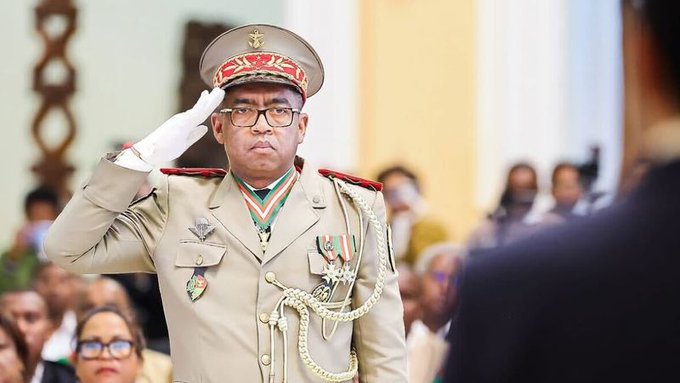Facebook Twitter (X) Instagram Somali Magazine - People's Magazine
Madagascar’s President Andry Rajoelina has appointed army General Ruphin Fortunat Zafisambo as the country’s new Prime Minister, following a week of intense anti-government protests that erupted over severe water and electricity shortages. The announcement came just days after Rajoelina dissolved his previous government in an attempt to quell growing public anger and restore stability across the nation.
The decision to name Zafisambo as prime minister marks a significant shift in the president’s approach, as he turns to a military figure to help address what many see as a deepening crisis of governance and trust. The protests, driven largely by the country’s youth and amplified through social media, have continued for three weeks, drawing comparisons to global “Gen-Z” movements known for their online mobilization and political activism.
Speaking from the presidential palace in the capital Antananarivo, Rajoelina said the new prime minister was chosen for his discipline, leadership, and ability to restore public confidence. “I have decided to appoint Ruphin Fortunat Zafisambo as the new Prime Minister. He must be capable of restoring order and regaining the people’s trust,” Rajoelina said, emphasizing that the government’s top priority is to serve citizens with honesty and integrity.
Zafisambo is a career military officer who previously served as director of the military cabinet in the prime minister’s office from 2021 until his appointment. His elevation to the top civilian post reflects Rajoelina’s growing reliance on the military amid escalating protests that have shaken the island nation’s political landscape. Many protesters accuse the government of neglecting basic needs, such as access to clean water and reliable electricity, while the cost of living continues to rise.
Over the past few weeks, demonstrators have flooded the streets of Antananarivo and other major cities, demanding better living conditions and even calling for Rajoelina’s resignation. Social media has played a central role in organizing these protests, with young people using platforms like Facebook and X to share videos, rally supporters, and draw attention to widespread frustration with the government’s performance.
Despite the unrest, President Rajoelina has remained firm that his administration’s focus is on solving the country’s pressing infrastructure and energy problems. He insisted that the challenges facing Madagascar are complex but not insurmountable, and urged citizens to give his new government time to deliver tangible results. “Our goal is to ensure that every Malagasy has access to clean water and electricity,” he said. “These are not luxuries—they are basic rights.”
Analysts say Rajoelina’s decision to dissolve his government and appoint a military prime minister could be seen as an attempt to restore authority and stability amid growing dissent. However, some critics fear the move might signal a more authoritarian approach, potentially deepening tensions between the government and protesters.
For now, the focus is on whether Zafisambo’s leadership will bring calm to the streets and confidence back to the public. His military background may help enforce order, but lasting peace will depend on how quickly the government can address the root causes of the unrest—particularly the worsening power and water crises that sparked the protests in the first place.
Madagascar, an island nation of over 30 million people, has long struggled with political instability, poverty, and inadequate infrastructure. While Rajoelina’s administration has pledged reforms to improve public services, citizens say progress has been too slow and uneven, leaving many without essential resources.
As the new government takes shape, the public’s expectations remain high. Zafisambo now faces the daunting challenge of balancing security with social reform, and convincing a restless generation that change is still possible under Rajoelina’s leadership.

